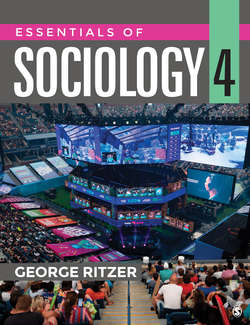Читать книгу Essentials of Sociology - George Ritzer - Страница 67
На сайте Литреса книга снята с продажи.
The Scientific Method
ОглавлениеThe scientific method is a structured way of finding answers to questions about the world (Carey 2011). The scientific method employed by sociologists is much the same as that used in other sciences. Although in practice creative sociological research often does not slavishly adhere to the following steps, they constitute the basic scientific method:
1 A sociologist uncovers questions in need of answers. These questions can be inspired by key issues in the larger society, personal experiences, or topics of concern specifically in sociology. The best and most durable research and findings often stem from issues that the researcher connects with personally. Karl Marx, for example, detested the exploitation of workers that characterized capitalism; Max Weber feared the depersonalizing impact of bureaucracies.
2 Sociologists review the relevant literature on the questions of interest to them. This is because others have likely done similar or related research in the past. After more than a century of doing scientific research, sociologists have learned a great deal about many things. It would make no sense to start over from the beginning. For example, Ritzer’s (2019) work on McDonaldization is based on the study of the work on rationalization by Max Weber ([1921] 1968), his successors (such as Kalberg 1980), and more contemporary researchers. Other scholars have since reviewed his work and that of other scholars of McDonaldization (for a collection of this work, see Ritzer 2010c). They have amplified the concept and applied it to domains such as religion (Drane 2008), higher education (Hayes 2017; Hayes and Wynyard 2002), social work (Dustin 2007), psychotherapy (Goodman 2016), and Disney World (Bryman 2004; Huddleston, Garlen, and Sandlin 2016). The ideas associated with McDonaldization have also been used as a way of teaching Max Weber’s complex theories to undergraduates (Aldrich and Lippmann 2018).
3 Researchers often develop hypotheses, or educated guesses, about how social phenomena can be expected to relate to one another. Uri Ram (2007) hypothesized that Israeli society would grow increasingly McDonaldized, and he found evidence to support that idea. Marx hypothesized that the conflict between capitalists and workers would ultimately lead to the collapse of capitalism. However, capitalism has not collapsed, although it came close in 1929 at the beginning of the Great Depression and maybe in 2008 at the onset of the Great Recession. This makes it clear that hypotheses may not be confirmed by research or borne out by social developments, but such speculation is important to the scientific method.
4 Researchers must choose research methods that will help them answer their research questions. Sociology offers diverse methodological tools; some are better than others for answering certain kinds of questions. For example, some sociologists are interested in how a person’s social class shapes his or her opinions about social issues. Surveys and other quantitative tools may be best to evaluate the relationship between class and attitudes. Other sociologists want to know how people interpret and make sense of their social world, and how this meaning-making shapes social action. Qualitative methods, such as observations and interviews, may be helpful for studying these issues.
5 Researchers use their chosen methods to collect data that can confirm—or fail to confirm—their hypotheses. Most contemporary sociologists venture into the field to collect original data through observations, interviews, questionnaires, and other means.
6 Researchers analyze the data collected, assessing their meaning in light of the hypotheses that guided the research. For example, Émile Durkheim hypothesized that those who were involved with other people would be less likely to commit suicide than those who lived more isolated existences and were experiencing what he called anomie. Analyzing data from several nineteenth-century European countries, Durkheim ([1897] 1951) found that the suicide rates were, in fact, higher for widowed or divorced people than for those who were married and therefore presumably better integrated socially.
